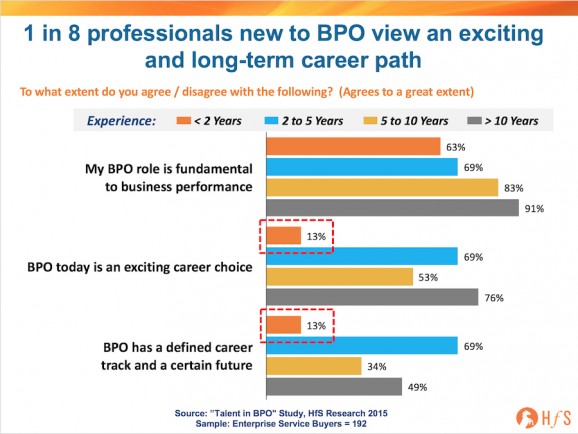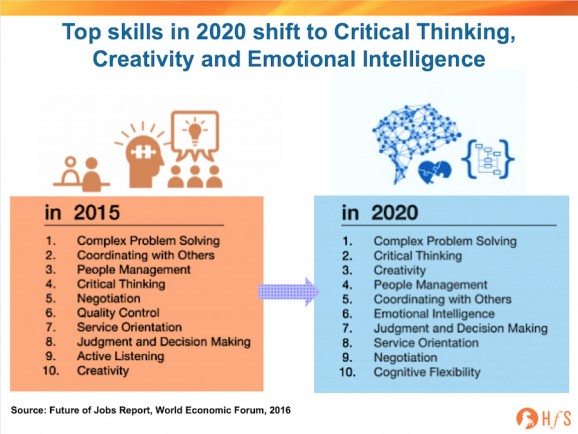 When your enterprise is increasingly dependent on hiring “Millennials” with digital skills and lower wage needs, you’d better figure out a plan for creating exciting, challenging career paths, or you’re pretty much already doomed.
When your enterprise is increasingly dependent on hiring “Millennials” with digital skills and lower wage needs, you’d better figure out a plan for creating exciting, challenging career paths, or you’re pretty much already doomed.
Sadly, our Talent in BPO study from last year tells a very depressing tale when you ask BPO delivery executives what they think of their BPO career:
What’s alarming is the failure of enterprises to create and communicate a viable BPO career path for seven-out-of-eight professionals with under two years’ experience. And – while 63% of newbies strongly agree their job is vital to business performance, a depressing one-in-eight are actually excited by their career choice. When people get past the first couple of years, their experience clearly improves, but the concern here is how can we attract top (or even middling) talent into BPO careers, when there is such a negative perception of the potential of the job. If we can’t attract the talent, the industry will never progress beyond a cost/efficiency play.
What can we do to attract the “Digital Generation” into the BPO business?
Start new hires on activities that require creativity and critical thinking. Working in BPO has to be about delivering capabilities beyond rote, operational processes. Today’s college graduates are simply not coming out of school willing to perform mundane routine work. Just look at the new WEF jobs report to see how skills requirements are quickly shifting, as business needs evolve – especially the need for creative skills, going from number ten to number three in merely five years:
In the past, for example, an accountant would often earn his/her chops processing accounts and doing routine GL work, before progressing to controllership activities, such as budgeting, quality audits, FP&A, forecasting and risk assessment work. With much better technology and offshoring available, the days of people doing highly-automatable / offshorable processes are fast dying. Everyone knows they will be irrelevant in the future if that is all they do.
Operations staff proactively need to support the fast-shifting needs of the front office. So the focus needs to shift towards creating a work culture where individuals are encouraged to spend more time interpreting data, understanding the needs of the front end of the business and ensuring the back/middle office can keep pace with the front office. This is especially the case in industries that are more dependent than ever on real time data, using multiple channels to reach their customers and being able to think out-of-the-box with disruptive business models. Sure, we all need to make sure we can keep the operations functioning by paying the bills, responding to customers, processing the claims etc, but if we can’t be proactive and look at how we can create a better customer experience using digital channels, or challenging the logic of running a process a certain way, we’ll never create work cultures that will attract the bright minds to take us forward.
Driven managers, multidisciplinary teams and flat structures essential to drive collaboration and Design Thinking. People want to feel a part of something and that their work matters – and the best way to do this is to move away from rigid corporate structures of the past, with too many management layers and departments run siloed like mini-empires. Both buyers and service providers need to invest in driven managers which understand how to motivate and collaborate across business functions. Sales, marketing, customer service, IT, finance, HR and supply chain are functions that all depend on each other to be effective. Smart enterprises are already breaking down the silos and creating multidisciplinary teams, using collaborative tools and Design Thinking methods across delivery centers to help their staff be more motivated, creative and challenge the old way of doing things.
The Bottom-line: Enterprises need to create broader “business manager” roles to challenge the Digital Generation
Beyond just moving up the ranks, there is a certain clout attached to becoming some kind of subject matter expert, taking pride in the ownership of a certain area of expertise. In my viewpoint, there should be two roles for BPO staff in their first two years: associate business manager leading to business manager. This individual needs to oversee a process, or set of processes, with the task of constantly seeking out ways to do things better by interpreting data, collaborating with colleagues and service partners, delighting customers and understanding the business. The onus in on the operations leaders to appoint and train team leaders to inspire junior staff to take ownership of their areas and not feel like “back office” process jockeys.
This blog could have been the start of a very long book about how “Businesses should be Designed for the Digital Generation” but instead is a starting point for how we can rethink operations jobs to attract better talent and deliver much more value beyond merely keeping the lights on. These may be early days, but if today’s business are not already thinking this way, they could already be doomed…
Posted in : Business Process Outsourcing (BPO), Captives and Shared Services Strategies, Contact Center and Omni-Channel, CRM and Marketing, Design Thinking, Digital Transformation, Finance and Accounting, Global Business Services, Healthcare and Outsourcing, HfSResearch.com Homepage, HR Outsourcing, HR Strategy, kpo-analytics, smac-and-big-data, Social Networking, Sourcing Best Practises, sourcing-change, Talent in Sourcing, The As-a-Service Economy, the-industry-speaks









Phil,
Excellent piece. The Business Manager role suggestion is very compelling. We need to move away from the SME roles that pigeon-hole staff into silos and demotivates them. Giving them a broader reemit to impact their firms is exactly the way we must go. The challenge is finding / reorienting middle managers to think this way and motivate their teams in this way,
Brian
Brilliant post, Phil – well thought out and excellent recommendations to enterprises. My one observation is these guidelines for the Digital Gen should be applied across all staff, not just BPO,
Rob
@Brian – what seems to be working with some firms is hiring younger managers who can relate better to the emerging Digital culture, who have strong collaboration and motivational skills. Taking people with good startup experience can work well too. Essentially, management skills that worked in legacy corporate environments aren’t working anymore for many firms…
PF
@Rob – completely agree these dynamics are universal across so many corporate roles and functions… but especially important to BPO, which suffers from being ill-defined and dominated by an obsession to manage to the contract, than to business outcomes,
PF
Phil,
There are several things companies can do stimulate a more energized, creative and collaborative work environment – here are some ideas:
open plan office environment
casual dress
work at home 2 days per week
weekly brainstorming sessions
regular training sessions for analytics
regular design thinking sessions
one “creative day” per week when staff can work on anything they want
Sheila
[…] Rescuing BPO from its trough of directionless boredom: Make jobs challenging and creative – And – while 63% of newbies strongly agree their job … requirements are quickly shifting, as business needs evolve – especially the need for creative skills, going from number ten to number three in merely five years … […]
Thanks Phil for highlighting once again the human aspect of outsourcing. In whole cacophony of buzzwords (yes I’m looking at ‘six sigma’, ‘flat world’ and now the latest one ‘RPA’) this most basic part is grossly ignored sometimes.
Nice insight, Phil!
Couldn’t agree more on your point that talent in today’s age want to part of something that matters/ makes a difference. Gone are the days where one could simply survive by following the decision-tree or entering data. RPA will anyways make typical BPO workforce redundant and escalating labor costs in emerging markets is also driving this need even further.
Best!
Rahul